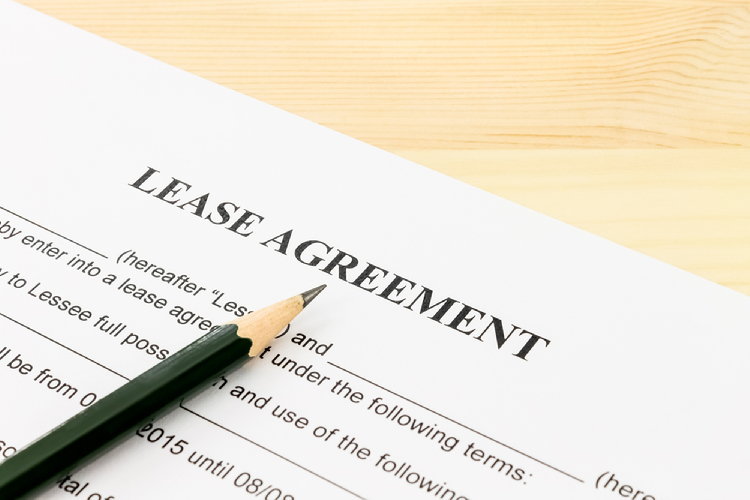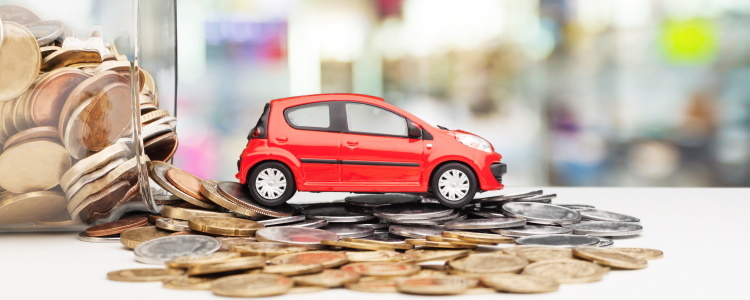Auto leasing isn’t right for everyone, especially if you're struggling with bad credit. Though leasing can seem appealing since you're not paying the entire price of the vehicle, it can be more difficult to qualify for. A lower cost each month is one of the many advantages of leasing, which is a big draw in today's world of high-priced cars, trucks, and SUVs.
Whether or not you think leasing is a good idea is subjective. For some people, it’s the perfect way to get a brand-new car without spending tens of thousands of dollars over a few years. For others, vehicle leasing just doesn’t fit their everyday needs.
There are pros and cons of leasing a car, and if you’re on the fence about trying it, check out the most common reasons why or why not leasing is a good move.
Thinking About Leasing Your Next Car?

Your credit history dictates your purchasing and leasing power. This is because your credit history generates your credit score, which gives lenders and leasing companies an idea of your creditworthiness.
If you’ve got your eyes on a brand new leasing deal, but you’re not sure if you should go through with it, the first thing you need to do is check your credit. New car leasing is almost always reserved for borrowers with good to great credit scores.
If your credit score has seen better days, you’re probably more likely to get approved for auto financing rather than a lease. The vast majority of new vehicles are leased to borrowers with credit scores above 670.
Additionally, the better your credit score, the better the money factor you’re likely to qualify for. The money factor in leasing is comparable to an interest rate on a car loan, both of which are largely influenced by your credit score. If you do get approved for a lease with a lower credit score, your monthly payment is probably going to be more expensive.
Can You Afford a Lease?
Answering the question of whether or not you can afford a lease can be tricky since lease payments are usually cheaper than loan payments. How expensive leasing might be can depend on the money factor, how you treat your vehicles, how much you drive, and the length of the lease.
With leasing, you have mileage limits, which vary depending on the program. But if you tend to drive more than 10,000 to 15,000 miles a year and don’t buy extra miles up front, you’ll likely end up paying extra when you return the car.
Additionally, you’re expected to maintain the vehicle and return it in good condition. Off-lease cars are usually sold once they’re returned, so the leasing company wants the vehicle returned in good shape. If you return a car with excess wear and tear, or you neglect some needed repairs, expect to pay to cover any needed repairs or fees.
If you take good care of your vehicles, and you have enough income to cover non-warranty repairs, leasing could be a great deal for you if you want to drive a new car every few years. Which brings us to another point: are you OK with always having a car payment?
When you lease, you’re only paying for the time you have the vehicle – you aren’t paying for the entire car. If you're thinking of leasing for the foreseeable future, you’re always going to have a car payment until you decide to finance or stop driving.
Another aspect to consider is the cost of auto insurance. When you finance or lease a vehicle, you’re required to have full coverage car insurance. Since leased vehicles are typically new, you’re likely to pay more for auto insurance than you would if you financed a less expensive used car.
Benefits of Leasing a Car
Leasing is a great option for someone who wants the latest technology, or to drive a brand of vehicle they’ve never had before. Leases also give you an opportunity to drive a well-equipped, high-priced car that you might not be able to otherwise afford. And, when the term is up, you can purchase the vehicle, or turn in the car and walk away.
Ideally, you should be able to lease a car if you have good credit, a stable income, and an average daily long commute. Leases come with mileage limits, and although you can offset additional mileage by paying for extra miles up-front, you should make sure that if you don’t pay for additional miles, the mileage limit isn’t going to cost you in the end.

Here are some of the biggest benefits of leasing:
1. No long-term commitment
Lease terms are typically only two or three years, which means you’ll always be driving a newer vehicle every few years. Compare this to the average auto loan and you're looking at a potentially big time difference since many new car loans are getting longer every year. The Average lease is only 24 to 36 months, whereas the average car loan can be anywhere from 36 to 84 months.
2. Only pay for what you use
This goes hand-in-hand with the short term of a lease. You only pay for the portion of the car you use, based on depreciation. Your monthly payment is usually lower compared to buying the same vehicle. Having a lower monthly payment is one of the biggest all-around benefits of leasing.
3. No large down payment requirement
The typical down payment requirement for a bad credit car loan is at least $1,000 or 10% of the vehicle's selling price. When you lease, this requirement isn't part of the deal, so you won't have to come up with extra cash upfront. However, be aware that leases do have a particular amount due at signing which must be paid before you can take delivery of the vehicle.
4. Warranty coverage
Leased cars are usually under warranty for most, if not all, of the time you have them. In some cases, this can save you a great deal in regular maintenance charges. Manufacturer-backed warranties typically cover the entire lease term and cover more than a dealer warranty that you may find on a used car.
5. You have options at the end of the lease
If you love the car, you can choose to buy it. You also can lease another vehicle, or simply walk away.
6. New car
Lease vehicles are generally new cars, you aren't going to end up leasing a used vehicle. This can be a great perk if you want to drive a new car every few years. New cars can be more fuel efficient, full of the safety and technology features you're looking for, and a better overall value since you typically don't have to shell out for repairs.
7. Advanced safety and technology features
New vehicles have more features, and typically more advanced safety and technology equipment than used cars, depending on the trim level you choose.
As you can see, leasing a vehicle has several advantages. However, whether those are enough to make leasing worthwhile depends on how they stack up against the potential downsides. However many advantages there are, though, there are some big disadvantages of leasing a car, too.
Disadvantages of Leasing a Car
Even though leasing can be a great option if you qualify, there are some drawbacks as well. These downsides can really make a clearer case for purchasing a vehicle. Let's take a look:
1. You’ll Always Have a Car Payment
Most lease contracts are around two to three years long. Since leasing is like renting a vehicle for 24 to 36 months, you need to search for another vehicle every couple of years and continue having a car payment until you buy something – or choose a vehicle-free lifestyle!
The monthly payments on a car lease are generally lower than financing a brand new car, but long-term, you may not be saving money because you’re always making payments. Always having to worry about a car payment can be considered a big disadvantage to many borrowers.
If you finance a vehicle instead, you have the option to complete your auto loan and own the vehicle completely – which means no car payments until you decide to borrow or lease again!
2. It’s Hard to Get Out of a Lease
Leasing contracts are rather ironclad, and it can be very difficult to get out of one. Until you completely pay off everything you owe (or find someone to take over your lease), you’re stuck with the vehicle until the end of the term.
Ending a lease term early almost always comes with early termination fees (ETFs), and possibly having to pay what you owe in a lump sum to get out of the agreement.
Vehicle financing gives you the ability to sell the car when you’re ready for something else. As long as you pay off your loan amount, either with money from the sale or a combination of sources, you can sell your vehicle at any time without paying extra fees to the lender.
3. Modifications Aren’t Allowed on Leased Vehicles

During an auto lease, modifications can cost you. It’s not that installing modifications on a leased car is more expensive – it's that leasing companies want the vehicle returned in stock condition.
When a leased vehicle is returned at the end of the lease term, it’s usually prepped to be sold as a pre-owned vehicle. For this reason, the leasing company wants the car with its original equipment, and in good condition. Additionally, modifications have the potential to void the manufacturer’s warranty. If you do decide to mod your leased vehicle, it likely means when you return it.
When you finance a car, you can modify it if you’d like without the risk of paying extra fees. Your name is on the financed vehicle’s title, so it’s yours to do with what you wish.
4. There are Mileage Limits: Frequent Drivers Beware
If you drive more than 15,000 miles a year, then leasing may be a disadvantage to your wallet. Leasing companies assign mileage restrictions to leased vehicles to limit the number of miles and wear and tear the car is returned with. This helps to preserve the condition of the vehicle for later resale.
Mileage limits on a lease are typically around 10,000 to 15,000 miles a year. If you drive more than your allotment, it means paying extra mileage fees. There’s usually an option to purchase extra miles at a lower cost upfront if you think you need them. But, it’s more money you need to shell out, and there's no refund if you don't use the extra miles.
With auto financing, there aren’t any mileage restrictions. Frequent drivers can rest easy when they own their vehicle or during their auto loan. Of course, excessive mileage can lower your car’s value, but you don’t have to keep track of how much you drive with a loan.
5. Wear and Tear Charges
Another expense can be excess wear and tear charges at the end of your term. Lease vehicles have to be kept in good condition, and anything over "normal" wear and tear is going to incur a fee. This means keeping up with regular maintenance and repairing anything above “normal” wear and tear before turning it in.
6. Higher insurance premium
You're typically required to carry a higher limit of full coverage insurance on a leased car than on a loan. This higher level of insurance usually means paying more.
7. Bad Credit Borrowers May Not Have a Chance
It sounds harsh, but if you have poor credit auto leasing may not be an option for you. Most leasing companies have high credit score requirements, making it hard for those with credit challenges to get into a lease.
Additionally, your credit score is the biggest factor in your money factor; a.k.a. leasing interest rate. A poor credit score typically leads to a higher money factor, which leads to a higher monthly payment.
Those with poor credit ratings typically have a better chance of getting into an auto loan, since there are different lenders for varying credit types.
Is Car Leasing a Good Idea?
Ultimately, it’s up to you to determine if it’s worthwhile to lease or to buy. Keep in mind that leasing isn’t something that’s even available to everyone. If you’re struggling with credit issues, for example, you may find it very difficult to qualify for a lease, and it may be more of an advantage to finance a car.
Typically, leases are reserved for people with good to excellent credit. So, be sure to weigh all the pros and cons of leasing a vehicle before you start going from dealer to dealer.
If you decide that leasing isn’t the way to go, the good news is that financing a car may be more cost-effective than you think. Even if you have poor credit, getting a car loan is possible as long as you’re working with the right dealer and lender.
When you get an auto loan from a subprime lender – a lender that's prepared to work with people in unique credit situations – you have the opportunity to finance the vehicle you need while also improving your credit score.
Even though leasing looks good on the surface, many people can’t afford to purchase the car at the end of their term. A new vehicle is nice to have, but as costs continue to increase, the purchase price due at the end of a lease is larger, too.
If you're hesitant to lease, you may be able to get an auto loan on a reliable, affordable car, such as an off-lease certified pre-owned vehicle, which can give you many of the same, or similar, features you find in new cars. Plus, doing this means you own the vehicle at the end of the loan and can take advantage of all the equity you gain, which isn't always possible in a lease.
The Bottom Line
If you're looking to lease because you need or want a new vehicle every few years, and you have the means to do it, leasing could be for you. However, if your credit score isn't making it easy, auto financing could be the way to go.
When you buy a car through a subprime lender you may still have the chance to qualify for something newer, or a certified pre-owned car. And if your goal isn't to own a vehicle long term, keeping up with your vehicle’s maintenance, limiting your miles, and keeping it clean can help maintain its value and make it easier to sell later on.
Also, financing is typically easier for borrowers with less-than-perfect credit. A good way to repair a poor credit score is by taking on new credit you can handle. If your goal is to lease in the future, but your credit score isn’t up for the job, then a bad credit auto loan could be the way you turn your credit around to increase your odds of getting a lease in the future.


















